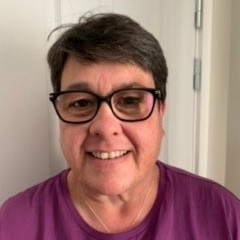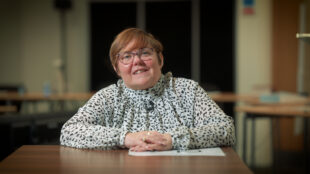[English] - [Cymraeg]
If you follow our social media channels, over the last few weeks you may have seen some of our staff sharing their experiences of what it’s like to work behind the scenes in the criminal courts.
With women making up 70% of our workforce, for International Women’s Day, we spoke to some of the women who work in the criminal courts, learning more about their experiences of being a woman in criminal justice.
We also discussed how they support other women to access the justice system, whether that’s championing and enabling new initiatives that support female defendants or victims of crime, or small considerations that enable female witnesses to give their best possible evidence.
Supporting those affected by domestic abuse
Delivery manager Karen has been instrumental in co-ordinating first hearing courts for domestic abuse cases in Yorkshire. This initiative aims to ensure that these types of case can run more efficiently, with the right resources and support from various agencies.
One of the challenges in domestic abuse cases is maintaining the victim’s engagement throughout the legal process. Karen has seen instances where, without the victim’s involvement, there is high risk of cases failing.
She says that its often seemingly small things that can help victims and complainants of domestic abuse to feel more engaged in the proceedings and confident to give evidence. Part of the process in the first hearing court is making sure that special measures applications are made at that first hearing.
Victims often don't want the defendants to see them, so by arranging for them to give evidence from behind a screen or arranging them to arrive through private entrance into the witness waiting area can all make a difference.

This is something Bethan, a delivery manager who works with vulnerable witnesses, has first-hand experience of. She supports vulnerable witnesses to give evidence, by taking steps to ensure they can remain anonymous by giving evidence behind a screen.
Going the extra mile
Bethan recognises the importance of other small actions in helping women who find themselves in the court feel less anxious about the court process. She explained that issues such as period dignity can impact on a witnesses’ ability to give evidence and how she makes sure that period products are available in witness waiting areas in her court.
She appreciates coming to court can be worrying for many people and says this is just one less thing for women to worry about:
It’s stressful enough and something as simple as helping with that could alleviate some of the stress they are feeling.

As a listing officer, Ami recognises the impact of waiting for their case to be heard can have on victims of sexual assault and domestic abuse and where possible we’ll always try and list domestic violence and sexual assault cases as soon as we can.
She gave an example of one particular case where she was able to work with her resident judge, the Crown Prosecution Service and defence to review the current case list to ensure a domestic abuse case could be heard as early as possible. Her work had a huge impact on the victim who had been worried about how she would cope financially.

Supporting female defendants
Marie is an Intensive Supervision Court-Coordinator working at an Intensive Supervision Court (ISC) pilot site specifically for female offenders. The ISC diverts offenders with complex needs away from short custodial sentences and into enhanced community-based sentences. They aim to reduce reoffending by targeting the root causes of offending behaviour and supporting access to substance misuse and mental health treatment, education, and employment. Marie acts as the ‘middleman’ between all the agencies involved in the scheme.
Women involved in the pilot meet individually once a month with the district judge in a more informal setting, which Marie says can encourage them to speak more freely about their experiences.
They talk about how they’re getting on with the order, all their appointments, what’s going to happen for the next month, and set goals and targets for themselves. It’s from there that we start building the relationship with the women.
It’s seeing the ladies go from the very first time when they walk in and they’re nervous and defensive, to seeing them over the months at each review, starting to open up, trust the judge and talk about things they look forward to doing.

Marie outlined the progress she's noticed that's already been made by some of the women on the pilot in Birmingham and tells us some of the women have gone back to university and others have returned to full time employment.
Working in the courts
There are plenty of other examples of brilliant women working across the justice system and our quartet are all big advocates for opportunities available.
Ami advised, “if you want to work in a court service, you have to be committed. You need to love the challenges because every day you'll face with the new challenges. But in that you need to find the positivity as well, because how you are going to play your part and get a result.”
The challenges and variety were something that Karen also enjoys:
The role of a legal adviser in HMCTS is a great role, the position of providing independent legal advice and ensuring a fair hearing is unique and the fact that we're dealing with such a wide range of work, is very rewarding.
Young women considering a career in the law to consider the options outside the norm, outside the box and look wider, HMCTS is part of that wider picture.
And Bethan added:
Just because you're a woman, it doesn't mean you can't go as high as you want to in criminal justice. There are no ceilings on any jobs, and if you want to go for something, go for it.
[English] - [Cymraeg]
Dewch i gwrdd â’r merched yn ein llysoedd troseddol
Os ydych yn dilyn ein sianelau cyfryngau cymdeithasol, dros yr wythnosau diwethaf mae’n debyg eich bod wedi gweld rhai o’n staff yn rhannu eu profiadau o sut beth yw gweithio yn y cefndir yn y llysoedd troseddol.
Gyda merched yn cynrychioli 70% o’n gweithlu, i ddathlu Diwrnod Rhyngwladol y Merched, bu inni siarad gyda rhai o’r merched sy’n gweithio yn y llysoedd troseddol, gan ddysgu mwy am eu profiadau o fod yn ddynes ym maes cyfiawnder troseddol.
Bu inni drafod hefyd sut maen nhw’n cefnogi merched eraill yn y system gyfiawnder, p’un a yw hynny’n hybu a galluogi mentrau newydd sy’n cefnogi merched sy’n ddiffynyddion neu ddioddefwyr troseddau, neu ystyriaethau bychain sy’n galluogi tystion benywaidd i roi’r dystiolaeth orau bosib.
Cefnogi’r rhai hynny sydd wedi’u heffeithio gan gam-drin domestig
Mae Karen, sy’n Gyfarwyddwr Cyflawni, wedi chwarae rôl allweddol wrth gydlynu’r llysoedd gwrandawiadau cyntaf ar gyfer achosion cam-drin domestig yn Swydd Efrog. Mae’r fenter yn anelu at sicrhau bod y mathau hyn o achosion yn gallu mynd rhagddynt yn fwy effeithlon, gyda’r adnoddau a’r gefnogaeth gywir gan amrywiaeth o asiantaethau.
Un o’r heriau gydag achosion cam-drin domestig yw cynnal ymgysylltiad y dioddefwr trwy gydol y broses gyfreithiol. Mae Karen wedi profi achlysuron lle, heb gyfraniad y dioddefwr, mae risg uchel y bydd achosion yn methu.
Mae hi’n dweud y mae pethau sy’n ymddangos yn bethau bychain yn gallu helpu i ddioddefwyr ac achwynwyr cam-drin domestig deimlo’n fwy yn rhan o’r achos ac yn fwy hyderus i roi tystiolaeth. Rhan o’r broses yn y llys gwrandawiad cyntaf yw sicrhau bod ceisiadau mesur arbennig yn cael eu gwneud yn y gwrandawiad cyntaf hwnnw.
Yn aml iawn nid yw’r dioddefwyr eisiau i’r diffynyddion eu gweld, felly gall trefnu fel eu bod yn rhoi tystiolaeth o du ôl i sgrin neu drefnu iddynt ddod i mewn i’r llys drwy fynediad preifat i fynd i’r ystafell aros i ddioddefwyr wneud gwahaniaeth fawr.

Dyma rhywbeth y mae gan Bethan, cyfarwyddwr cyflawni sy’n gweithio gyda thystion bregus, brofiad uniongyrchol ohono. Mae hi’n cefnogi tystion bregus i roi tystiolaeth, trwy gymryd camau i sicrhau eu bod yn gallu bod yn anhysbys trwy roi tystiolaeth y tu ôl i sgrin.
Mynd yr ail filltir
Mae Bethan yn cydnabod pwysigrwydd gweithredoedd bychain eraill sy’n helpu merched sy’n dod i’r llys i deimlo’n llai pryderus am broses y llys. Esboniodd bod materion fel urddas mislif (period dignity) yn gallu effeithio ar allu tystion i roi tystiolaeth, felly mae hi’n sicrhau bod cynnyrch mislif ar gael yn y man aros i dystion yn ei llys hi.
Mae’n gwerthfawrogi bod dod i’r llys yn gallu peri pryder i lawer o bobl ac mae hyn yn un peth yn llai i ferched bryderu amdano:
Mae’n brofiad sy’n peri digon o straen yn barod, ac mae rhywbeth syml fel helpu gyda hynny yn gallu lliniaru rhywfaint o’r straen maen nhw’n ei deimlo.

Fel swyddog rhestru, mae Amy yn cydnabod yr effaith y mae aros i’w hachos gael ei wrando yn ei gael ar ddioddefwyr ymosodiadau rhywiol a cham-drin domestig a lle bo’n bosibl byddwn wastad yn ceisio rhestru achosion cam-drin domestig ac ymosodiad rhywiol mor fuan ag y gallwn.
Rhoddodd enghraifft o un achos penodol lle’r oedd hi’n gallu gweithio gyda’i Barnwr preswyl, Gwasanaeth Erlyn y Goron a’r amddiffyniad i adolygu’r rhestr achosion gyfredol i sicrhau bod achos cam-drin domestig yn cael ei wrando mor fuan ag oedd yn bosib. Cafodd ei gwaith effaith anferthol ar y dioddefwr a oedd wedi bod yn pryderu am sut byddai hi’n ymdopi yn ariannol.

Cefnogi diffynyddion benywaidd
Cydlynydd Llys Goruchwyliaeth Ddwys yw Marie, sy’n gweithio mewn Llys Goruchwyliaeth Ddwys (ISC) ar safle sy’n cynnal cynllun peilot yn benodol i droseddwyr benywaidd. Mae’r ISC yn ailgyfeirio troseddwyr gydag anghenion cymhleth i ffwrdd o ddedfrydau o garchar byrion i ddedfrydau cymunedol uwch. Y nod yw lleihau aildroseddu trwy dargedu gwreiddiau ymddygiad troseddwr a chefnogi mynediad at driniaeth sy’n mynd i’r afael â chamddefnyddio sylweddau a phroblemau iechyd meddwl a chymorth gyda materion addysg a chyflogaeth. Mae Marie yn gweithredu fel y pwynt cyswllt rhwng yr holl asiantaethau sy’n rhan o’r cynllun.
Mae merched sy’n rhan o’r cynllun peilot yn cwrdd unwaith y mis gyda’r barnwr rhanbarth mewn lleoliad mwy anffurfiol, a meddai Marie bod hyn yn gallu eu hannog i siarad yn fwy agored am eu profiadau.
Maen nhw’n siarad am sut maen nhw’n dod yn eu blaenau gyda’r gorchymyn, eu hapwyntiadau i gyd, beth fydd yn digwydd yn y mis nesaf, a phennu amcanion a thargedau ar gyfer eu hunain. Rydym yn datblygu’r berthynas gyda’r merched o’r pwynt hwnnw.
Mae gweld y merched o’r foment maen nhw’n cerdded i mewn am y tro cyntaf, ac maen nhw’n nerfus ac yn amddiffynnol, i’w gweld dros gyfnod o fisoedd ym mhob adolygiad, yn dechrau bod yn fwy agored, yn ymddiried yn y barnwr ac yn siarad am y pethau maen nhw’n edrych ymlaen at wneud.

Bu i Marie amlinellu’r cynnydd mae hi eisoes wedi’i weld ymysg rhai o’r merched yn y cynllun peilot yn Birmingham ac mae hi’n dweud wrthym bod rhai o’r merched wedi dychwelyd i’r brifysgol ac mae eraill wedi dychwelyd i gyflogaeth amser llawn.
Gweithio yn y llysoedd
Mae digonedd o esiamplau eraill o ferched gwych yn gweithio ledled y system gyfiawnder ac mae pob un o’n pedwarawd yn barod iawn i hyrwyddo’r cyfleoedd sydd ar gael.
Cyngor Ami yw:
Os ydych eisiau gweithio mewn gwasanaeth llys, rhaid i chi fod yn ymrwymedig. Rhaid eich bod wir yn hoffi’r heriau oherwydd byddwch yn wynebu heriau newydd bob dydd. Ond o fewn hynny rhaid i chi ddod o hyd i bositifrwydd hefyd, o ran sut rydych yn chwarae eich rôl ac yn sicrhau canlyniad da.
Mae’r heriau ac amrywiaeth y gwaith hefyd yn rhywbeth mae Karen yn eu mwynhau:
Mae rôl cynghorydd cyfreithiol yn GLlTEF yn rôl wych, mae bod mewn sefyllfa i ddarparu cyngor cyfreithiol annibynnol a sicrhau gwrandawiad teg yn unigryw, ac mae’r ffaith ein bod yn delio ag amrywiaeth mor eang o waith yn rhoi llawer o foddhad.
Dylai merched ifanc sy’n ystyried gyrfa ym maes y gyfraith ystyried opsiynau y tu allan i’r norm, edrychwch yn ehangach - mae GLlTEF yn rhan o’r darlun ehangach hwnnw.
Ychwanegodd Bethan:
Nid yw bod yn ddynes yn golygu nad oes modd i chi fynd mor uchel ag y gallwch ym maes cyfiawnder troseddol. Nid oes cyfyngiadau ar unrhyw swydd, os ydych eisiau mynd am rywbeth, ewch amdani.
